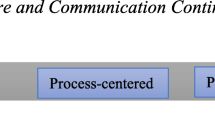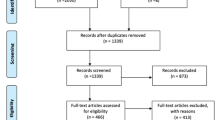Abstract
People diagnosed with a mental illness are at higher risk of developing preventable chronic diseases; thus, health literacy improvements may have great potential to impact health outcomes for this typically underserved population. However, there is a dearth of research on health literacy of persons with severe mental illness. The purpose of this research was to investigate aspects of health literacy and identify factors associated with low literacy among adults with severe mental illness using three literacy assessment tools. Seventy-one adults with serious mental illness were assessed and a high proportion had limited literacy levels: 42 % with the Single Item Literacy Screener, 50 % with the Rapid Estimate of Adult Literacy in Medicine-Short Form, and 67 % with the Newest Vital Sign. Findings suggest that individuals with certain mental illnesses and lower functioning may have more difficulty understanding health information and have limited numerical literacy.
Similar content being viewed by others
References
Aro, S., Aro, H., & Keskimäki, I. (1995). Socio-economic mobility among patients with schizophrenia or major affective disorder: A 17-year retrospective follow-up. The British Journal of Psychiatry, 166(6), 759–767.
Arozullah, A. M., Yarnold, P. R., Bennett, C. L., Soltysik, R. C., Wolf, M. S., Ferreira, R. M., et al. (2007). Development and validation of a short-form, rapid estimate of adult literacy in medicine. Medical Care, 45(11), 1026–1033.
Baker, D. W., Williams, M. V., Parker, R. M., Gazmararian, J. A., & Nurss, J. (1999). Development of a brief test to measure functional health literacy. Patient Education and Counseling, 38(1), 33–42.
Centers for Disease Control and Prevention. (2011). Mental illness surveillance among adults in the United States No. MMWR 60. Atlanta, GA: U.S. Department of Health and Human Services.
Chew, L. D., Griffin, J. M., Partin, M. R., Noorbaloochi, S., Grill, J. P., Snyder, A., et al. (2008). Validation of screening questions for limited health literacy in a large VA outpatient population. Journal of General Internal Medicine, 23(5), 561–566.
Community Alliance. (2012). Annual report. Omaha, NE: Community Alliance.
Davis, T. C., Crouch, M. A., Long, S. W., Jackson, R. H., Bates, P., George, R. B., et al. (1991). Rapid assessment of literacy levels of adult primary care patients. Family Medicine, 23(6), 433–435.
Davis, T. C., Long, S. W., Jackson, R. H., Mayeaux, E. J., George, R. B., Murphy, P. W., et al. (1993). Rapid estimate of adult literacy in medicine: A shortened screening instrument. Family Medicine, 25(6), 391–395.
Galletly, C., Neaves, A., Burton, C., Liu, D., & Denson, L. A. (2012). Evaluating health literacy in people with mental illness using the test of functional health literacy in adults. Nursing Outlook, 60(5), 316–321.
Hunt, M., & Stein, C. (2012). Valued social roles and measuring mental health recovery: Examining the structure of the tapestry. Psychiatric Rehabilitation Journal, 35(6), 441–446.
Koyanagi, K. (2007). Learning from history: Deinstitututionalization of people with mental ilness as precursor to long-term care reform No. 7084). Washington, DC: The Kaiser Family Foundation.
Krishan, S., von Esenwein, S. A., & Druss, B. G. (2012). The health literacy of adults with severe mental illness. Psychiatric Services, 63(4), 397.
Kutner, M., Greenberg, E., Yin, Y., & Paulsen, C. (2006). The health literacy of America’s adults: Results from the 2003 national assessment of adult literacy No. NCES 2006-483). Washington, DC: National Center for Education Statistics.
Manderscheid, R. W., Atay, J. E., & Crider, R. A. (2009). Changing trends in state psychiatric hospital use from 2002 to 2005. Psychiatric Services, 60(1), 29–34.
May, P. A. (1982). Susceptibility to substance abuse among American Indians: Variation across sociocultural settings. NIDA Research Monograph, 41, 34–44.
Morris, N. S., MacLean, C. D., Chew, L. D., & Littenberg, B. (2006). The Single Item Literacy Screener: Evaluation of a brief instrument to identify limited reading ability. BMC Family Practice, 7, 21.
National Alliance on Mental Illness. (2015). About mental illness. Retrieved February 28, 2013, from http://www.nami.org/template.cfm?section=about_mental_illness
NC Program on Health Literacy. (2014). Literacy assessment instruments. Retrieved February 28, 2013, from http://nchealthliteracy.org/instruments.html
Nielsen-Bohlman, L., & Panzer, A. M. (2004). Health literacy: A prescription to end confusion. Washington, DC: National Academies Press.
Nordt, C., Müller, B., Rössler, W., & Lauber, C. (2007). Predictors and course of vocational status, income, and quality of life in people with severe mental illness: A naturalistic study. Social Science and Medicine, 65(7), 1420–1429.
Parker, R. M., Baker, D. W., Williams, M. V., & Nurss, J. R. (1995). The test of functional health literacy in adults: A new instrument for measuring patients’ literacy skills. Journal of General Internal Medicine, 10(10), 537–541.
Parks, J., Svendsen, D., Singer, P., Foti, M. E., & Mauer, B. (2006). Morbidity and mortality in people with serious mental illness. Alexandria, VA: National Association of State Mental Health Program Directors (NASMHPD) Medical Directors Council.
Piatt, E. E., Munetz, M. R., & Ritter, C. (2010). An examination of premature mortality among decedents with serious mental illness and those in the general population. Psychiatric Services, 61(7), 663–668.
Public Health Service Act of 2013. (2013). 42 U.S.C. § 191.
Robson, D., & Gray, R. (2007). Serious mental illness and physical health problems: A discussion paper. International Journal of Nursing Studies, 44(3), 457–466.
Schoeyen, H. K., Birkenaes, A. B., Vaaler, A. E., Auestad, B. H., Malt, U. F., Andreassen, O. A., et al. (2011). Bipolar disorder patients have similar levels of education but lower socio-economic status than the general population. Journal of Affective Disorders, 129(1–3), 68–74.
Sharfstein, S. S., & Dickerson, F. B. (2009). Hospital psychiatry for the twenty-first century. Health Affairs, 28(3), 685–688.
Substance Abuse and Mental Health Services Administration. (2008). Mental health No. 10-4590. Rockville, MD: Substance Abuse and Mental Health Services Administration (SAMHSA).
Substance Abuse and Mental Health Services Administration. (2013). Results from the 2012 national survey on drug use and health: Mental health findings No. NSDUH Series H-47, HHS Publication No. (SMA) 13-4805). Rockville, MD: Substance Abuse and Mental Health Services Administration.
Tew, J., Ramon, S., Slade, M., Bird, V., Melton, J., & Le Boutiller, C. (2012). Social factors and recovery from mental health difficulties: A review of the evidence. British Journal of Social Work, 42(3), 443-460.
Weiss, B. D., Mays, M. Z., Martz, W., Castro, K. M., DeWalt, D. A., Pignone, M. P., et al. (2005). Quick assessment of literacy in primary care: The Newest Vital Sign. Annals of Family Medicine, 3(6), 514–522.
Author information
Authors and Affiliations
Corresponding author
Ethics declarations
Conflict of interest
The authors do not have any potential conflicts of interest.
Ethical standard
The study was approved by the Institutional Review Board of the University of Nebraska Medical Center and the Community Alliance. The informed consent was obtained from study participants.
Rights and permissions
About this article
Cite this article
Clausen, W., Watanabe-Galloway, S., Bill Baerentzen, M. et al. Health Literacy Among People with Serious Mental Illness. Community Ment Health J 52, 399–405 (2016). https://doi.org/10.1007/s10597-015-9951-8
Received:
Accepted:
Published:
Issue Date:
DOI: https://doi.org/10.1007/s10597-015-9951-8




